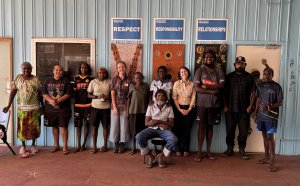Walking together in the desert: Psychological support for remote NT schools
Delivering support to remote schools in the Northern Territory is never a one-size-fits-all journey. These schools face a unique constellation of challenges: low student attendance, high staff turnover, diverse learning needs, and the fact that for many children, English is their third or fourth language. Add to that the impact of community events and cultural obligations, and it becomes clear that traditional models of support often fall short.
In response, the NT Department of Education took a bold and thoughtful step. Rather than directing Allied Health Services solely toward individual students, they adopted a more holistic, flexible approach. This shift allowed for creativity and responsiveness, two essential ingredients when working in remote communities where regular, structured sessions are often impractical or unaffordable.
The Australian Childhood Foundation was privileged to be part of this initiative, providing psychological support to schools across the Central Desert region. Our work took us on tiny planes across vast landscapes, into schools where the red dust meets resilience and community spirit.
Rethinking what support looks like
This project invited school leaders to think differently about what psychological support could mean. For principals already carrying immense workloads, finding the time and headspace to reflect on their school’s needs was not always easy. Similarly, teachers, often new to remote contexts, sometimes struggled to identify what kind of support would be most helpful.
That’s where flexibility became our greatest asset.
In some schools, our psychologists worked one-on-one with teachers to explore classroom-wide strategies for supporting students with complex needs. In others, we facilitated workshops for Indigenous Assistant Teachers, focusing on co-regulation and trauma-informed practices. We also delivered whole-school training sessions, followed by implementation support, though finding time in already packed school calendars was a constant challenge.
The power of presence and relationships
One of the most rewarding aspects of this project was the opportunity to work directly with Indigenous Assistant Teachers. These remarkable educators often face barriers to accessing professional development, whether due to distance, technology, or cultural considerations. Being able to deliver tailored, in-person training that built on their existing knowledge led to many powerful “lightbulb moments.”
The longevity of the project also allowed for something rare in remote service delivery: continuity. Our psychologists were able to return to schools multiple times, building trust and deepening relationships. This continuity made it possible to scaffold support over time, rather than relying on one-off visits.
Looking ahead
Of course, challenges remain. High staff turnover continues to disrupt continuity, and the competing demands on remote schools are unlikely to ease anytime soon. But this project has shown that with the right approach—one grounded in flexibility, respect, and relationship—meaningful support is not only possible, it’s transformative. Moving forward, we will continue to focus on co-designing whole-school approaches for emotional wellbeing that are specific to each community.
We extend our heartfelt thanks to the schools who welcomed us into their communities, and to the NT Department of Education for their vision and support. It is a privilege to walk alongside educators in the desert, learning as much as we shared.

